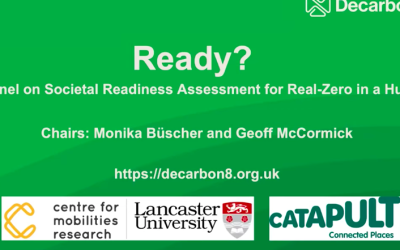Practices of car parking and the infrastructure of immobility
Karol Kurnicki, Institute of Advanced Study, Centre for Interdisciplinary Methodologies, University of Warwick, kurnicki@gmail.com, @karol_kurnicki
CeMoRe Seminar, 12th November 2019, Bowland North B67
My current project analyses practices of car parking in the context of everyday (im)mobility and infrastructure production in three European cities (London, Warsaw and Utrecht).
In the presentation I will build on the findings from ongoing fieldwork to show the intersection between people’s everyday (im)mobility and production of infrastructure.
I will argue that looking at parking from the perspective of infrastructure is productive in several ways. Firstly, it shows materialization of practice as occurring in the interaction between people and objects (cars), objects of (im)mobility (cars) and objects (cars) with their surroundings (parking spaces and other material elements, such as signs, kerbs, bollards, barriers). Secondly, it helps to rethink characteristics of urban infrastructure that differ from established conceptualisations that characterise it through invisibility, obduracy, connectivity or extensivity. Thirdly, it problematizes infrastructuring as a process that takes place not only in formal, systematic manner but also through daily activity of people. Simply put, when people park, they produce infrastructure, quite often only for a time and in places where no plan existed for it otherwise. Analysing parking can bring new ways of understanding how urban infrastructures are being composed from different (material and immaterial) elements by a variety of actors – from administration and service providers to regular drivers.
Against this backdrop I will also reflect on car parking as a peculiar social practice that adds nuance to the understanding of socio-material relations and dispersed agency in everyday activities. As such it problematizes existing definitions and poses questions to our understanding of human and non-human (im)mobility.
Image Source: “Car Park” by Martin Cogley is licensed under CC BY-NC-SA 2.0
Short biography
I am a WIRL-COFUND Fellow at the Institute of Advanced Study, University of Warwick. My research project is based at the Centre for Interdisciplinary Methodologies and looks social practices of car parking in the perspective of mobility and infrastructure studies. I am interested in the role of materiality in everyday mobility and processes of dealing with complicated socio-material challenges on the urban level. I see car parking is seen as an interdisciplinary object of study that connects various strands of socio-spatial theory and methodology, including digital and mobile methods. The research intends to have import on the theory of social practices, understanding of im/mobile objects in cities and challenges of urban complexity.
Research profile
Urban studies, mobility, infrastructure studies, critical sociology, architecture and urban planning, social theory
Academic background
My fellowship at CIM takes place between 2018 and 2020. Prior to that I have worked as a post-doctoral researcher in the Institute of Sociology, Jagiellonian University, where in 2015 I have completed my PhD on ideologies in urban space. The previous project I was involved in investigated socio-spatial processes of differentiation and boundary making in large housing estates. I was a visiting researcher at the Centre for Urban Conflicts Research, University of Cambridge (2014) and Culture, Theory, Space Research Cluster, University of Plymouth (2012). Apart from strictly academic activities I enjoy taking part in architectural design projects and occasionally write about urban space and architecture to non-academic journals.
CeMoRe Research statement
During my research at CeMoRe, I plan to work on two broader questions. First, I am interested in confronting my research with current developments in mobility studies. Specifically, I will explore the new conceptualizations of immobility as actively accomplished by actors in everyday life and connecting social and material aspects of life in urban spaces. Secondly, my project attempts to understand the intersection between social practices and infrastructure on the example of car parking. At Lancaster, I want to broaden my understanding of “infrastructuring” as a point of connection between mobility studies and theory of social practices. The questions of scalability, largeness and relationality of practices-infrastructure bind will be one of the major elements of investigation. Moreover, as my research looks at car parking, I plan to contribute to ongoing projects that look at socio-spatial transformations towards sustainability and futures of mobility.
Selected publications
Kurnicki K. 2018. Defending Modernist Architecture in Poland: Spaces of State, Emotions and Democracy. In: T. Großmann, P. Nielsen (eds.) Architecture, Democracy and Emotions. The Politics of Feeling Since 1945. London: Routledge
Kurnicki K. 2018. Ideologie w mieście. O społecznej produkcji przestrzeni [Ideologies in a City. On the Social Production of Space]. Kraków: Nomos
Kurnicki K. 2017. Mechanisms of Loss. In: K. Nawratek (ed.) Re-industrialization and Progressive Urbanism. New York: Punctum Books
Kurnicki K., Sternberg M. 2016. Arrested conflict: transnational place-making in Polish-German border towns. Space and Polity 20 (3). DOI: 10.1080/13562576.2016.1225860
Kurnicki K. 2014. Towards a Spatial Critique of Ideology: Architecture as a Test. Journal of Architecture and Urbanism 38(1). DOI:10.3846/20297955.2014.893642
[/odd_et_pb_team_member]




